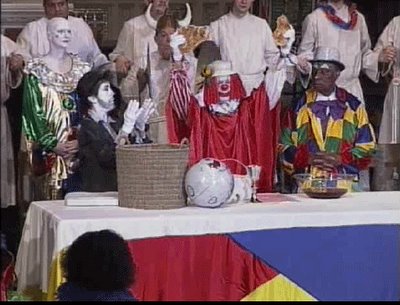ELCA NEWS SERVICE
February 10, 2006
ELCA Task Force on Human Sexuality Begins Anew
06-019-FI
CHICAGO (ELCA) -- The Evangelical Lutheran Church in America (ELCA) Task Force on Human Sexuality met here Feb. 2-5, welcomed six new members and began discussing which topics to include in study materials to help the church develop a social statement on human sexuality by 2009.
The work of the task force was mandated by the ELCA Churchwide Assembly in 2001. The ELCA's chief legislative body, the churchwide assembly, meets every other year; the next assembly will be here in August 2007.
The 2001 assembly asked for recommendations on two key questions regarding homosexuality -- whether or not the church should bless same-gender relationships and whether or not it should allow people in such relationships to serve the church as
professional lay and ordained ministers. It also asked for a social statement on human sexuality.
The task force issued its report and recommendations on homosexuality in January 2005. Directing its attention toward developing the social statement, the task force asked the ELCA Church Council for and received an extension from 2007 to 2009 for proposing a social statement. On its new time line, the task force will prepare materials to guide the church's 4.9 million members in a 2007 study and response that will inform drafting of the social statement.
[
My first comment is that it is highly unlikely that we have 4.9 million a year and a half from now. That will mainly be because laity and clergy are sick of the process and what comes out of it. I hope you know that this issue is not about sex, it is about, as Luther says, the clarity of Scripture.]
Goals for this particular meeting were to help new and continuing members function well together, "to start getting our minds around a very complex topic," and to identify priorities for the study process and the social statement, said the Rev.
Peter Strommen, bishop of the ELCA Northeastern Minnesota Synod, Duluth, and task force chair.
"I'm noticing that everyone on the task force is engaged, energized," Strommen said. "There is a very rich field of insights and inquiry being brought to the table. There is a very strong desire for the faith to be able to speak a wise and
helpful word. We recognize this is an enormous topic. We have a lot of learning to do -- a lot of work to do," he said.
"We want to engage the entire church in an interesting, helpful, transparent process. Our deep desire is that by the time this is all done there is a social statement that will genuinely aid the ministry of the church on a very important
topic," Strommen said, noting that human sexuality is often "tragically misused in our society."
[
If Stommen means by "tragic misuse" adultery, fornication, sodomy, prederasty, children having sex with other children, we agree, though I'm not sure that his use of adjectives is not tragic in itself]
Dr. Adina Nack, assistant professor of sociology, California Lutheran University (CLU), Thousand Oaks, Calif., made two presentations to the task force -- "Sexuality and Society" and "Sexuality Over the Lifespan." CLU is one of 28 ELCA colleges
and universities.
Nack used statistical averages to talk about the range of sexual behavior in U.S. society. She discussed popular culture and the media, research, differences between sex and gender, gender roles, sexual orientation, love and intimacy, extra-
relational sex, male and female sexual "scripts," the sexual body in health and illness, sexually transmitted infections, sex education and sexually explicit materials.
"Sexuality Over the Lifespan" included information about sexuality in infancy and childhood, influences in sexual development, family, adolescence, age of consent, early and young adulthood, being single, cohabitation, middle adulthood, marital
sexuality, divorce and widowhood, dating again, single parenting and stereotypes of aging.
"This group is undertaking a large and complicated task, so I wanted to give an overview of some of the major findings and debates among social scientists when it comes to studies of sexuality," Nack said later.
"I left people with more questions than answers, and unfortunately that's the reality of the subject matter," Nack said. "There are some clear answers (from) a standpoint of what seems to produce better health outcomes -- physical and mental
well-being -- but, when it gets to matters of morality and spirituality, it's a lot more fuzzy."
The Rev. James M. Childs Jr., former director, ELCA Studies on Sexuality, presented a paper, "Christian Perspectives on Sexuality." Childs is an advisor to the task force and a professor of systematic theology, Trinity Lutheran Seminary,
Columbus, Ohio. Trinity is one of eight ELCA seminaries.
Childs noted that the history of sexual ethics is marked by continuity and change. "It is important to recognize that the basic elements of traditional sexual ethics were shaped in circumstances very different from today, albeit lust has been a
constant," he said.
[
albeit your lust for change seems to be a constant, Jim.]
"We need to be aggressive and honest in facing those realities by asserting a countercultural Christian vision where necessary but in terms that grapple with present consciousness, not simply a reiteration of past formulas. We also need to be
deliberate in asking what changes in communication and normative judgment may be needed to maintain continuity," Childs said.
[
Counterculteral as in Brokeback Mountain, Jim, or as in the Bible?]
"We know the ideals expressive of God's purposes. We know the rules we have had in the service of those purposes and recognize the contextual nature of those rules," he said. "Do new developments in the present context suggest new ways to reformulate the ideals?" Childs asked.
[
Please, no reformulating, please!]
The Rev. Kaari M. Reierson, associate director for studies, and the Rev. Roger A. Willer, senior research associate, ELCA Church in Society, direct the task force's work on the statement.
In addition to Strommen, task force members (+ continuing, * new)are:
+ Erin Clark, graduate student, University of Illinois at Chicago
+ Dr. Julio A. Fonseca, psychologist, Dorado, Puerto Rico
* The Rev. Carol S. Hendrix, bishop, Lower Susquehanna Synod, Harrisburg, Pa.
+ The Rev. Gary J. Liedtke, pastor, St. Luke Lutheran Church, Waukesha, Wis.
* Peter O'Malia, youth minister, Hill Avenue Grace Lutheran Church, Pasadena, Calif.
+ The Rev. Kevin R. Maly, pastor, St. Paul Lutheran Church,Denver
+ Susan Salomone, program manager, Community Networks Day Habilitation Program, Enable (affiliate of United Cerebral Palsy), Syracuse, N.Y.
* The Rev. Scott J. Suskovic, pastor, Christ Lutheran Church, Charlotte, N.C.
+ Connie D. Thomas, principal, Lutheran Church of the Holy Spirit, Chicago
* The Rev. David L. Tiede, retired president and professor of New Testament, Luther Seminary, St. Paul, Minn.
* Dr. Marit A. Trelstad, assistant professor of religion, Pacific Lutheran University, Tacoma, Wash.
+ The Rev. Timothy J. Wengert, professor of Reformation history, Lutheran Theological Seminary at Philadelphia
* Sarah Hinlicky Wilson, graduate student, Princeton Theological Seminary, Princeton, N.J.
+ Dr. Diane M. Yeager, associate professor of religious ethics and religion and social theory, Georgetown University, Washington, D.C.
Advisors to the task force include representatives of the ELCA Church Council, ELCA Church in Society, ELCA Office of the Presiding Bishop, ELCA Vocation and Education, Evangelical Lutheran Church in Canada and Lutheran Youth Organization.
The task force's next meeting will be here April 21-23. A writing team of Tiede, Wilson and Yeager will present initial work on the study materials. The Rev. Roland D. Martinson, professor of children, youth and family ministry, Luther
Seminary, St. Paul, Minn., will make a presentation. Luther is an ELCA seminary.
"I'm excited to see what this group ends up producing," Nack said. [I'm not, I'm dreading it. I fear they will come up with something that will be quoted for years (well as the 2009 ELCA Social Statement says, ans this is current ELCA policy, man-boy love is an inherent right and we need to understand that the need to make puberty the age of consent...]"As a professor at an ELCA school and someone who teaches sexuality, I would definitely like eventually to incorporate the finished social statement into my courses," she said.
"We have a lot of interest among our college students at the various ELCA campuses in talking about sexuality. It's going to be a great starting place for a lot of good campus conversations and interactions with campus pastors," Nack said.
-- -- --
Information about the Task Force on Human Sexuality is at http://www.ELCA.org/faithfuljourney/ on the ELCA Web site.
For information contact:
John Brooks, Director (773) 380-2958 or news@elca.org
http://www.elca.org/news
ELCA News Blog: http://www.elca.org/news/blog
Do pray for the members. Using NAMBLA is hyperbole but when I said I dread their statement, that was the straight truth.







